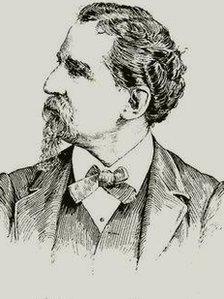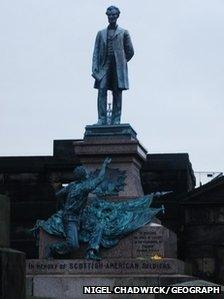Scots who fought in America's civil war
- Published

Highlands-born George Henry Mackenzie led Black Union soldiers
The US is marking the 150th anniversary of the 1861-65 American Civil War. But in Scotland too there is an effort to remember the bloody conflict.
Former serviceman, the Reverend Bill Mackie, is leading a charge.
With help from contacts in the US, he is gathering names of Scots who fought in the American Civil War with a hope they can one day be added to a memorial in Edinburgh.
The city's Scottish-American Soldiers Monument was officially unveiled in the Old Calton Cemetery in 1893 and is the only tribute of its kind outside the US.
It is inscribed with six names at the moment - Lt Col William L Duff, Sgt Maj John McEwan, Robert Steedman, James Wilkie, Robert Ferguson and Alexander Smith. The men fought for the Union north against the Confederate south.
Dr Mackie, who served with the Royal Navy and Royal Army Pay Corps and has in the past led services recalling Scots who died in the civil war, has found several other candidates for the memorial from the ranks of both armies.
He said: "Whilst not everyone could be added to such a monument, it would be good for some formal recognition of those Scots who fought in this war especially those who gave the ultimate sacrifice, irrespective of the side they fought on.
"By giving them recognition we not only remember them, we stimulate a wider knowledge of who they were and where they came from in Scotland."
From the Union forces, the suggested names include Glasgow-born John McTammany, who served in the 115th Ohio volunteers.
McTammany's ambitions to become a concert pianist were ended when he was seriously injured after enlisting in the army in 1864.
During his recovery he repaired pianos and music boxes and later, in 1876, he invented a type of automated musical instrument called a roller paper piano player.
Edinburgh's James Lorraine Geddes saw action with the 8th Iowa volunteers and also composed war songs The Stars and Stripes and The Soldiers' Battle Prayer.
Another Union soldier was George Henry Mackenzie, who was born 175 years ago in North Kessock, a small community across the Beauly Firth from Inverness.
Mackenzie had served in the British Army - he had been an officer with the King's Royal Rifle Corps - before he arrived in America in 1863 and enlisted.
As a captain, he led Black Union soldiers but later deserted. He rejoined the army in 1864 and fought at three battles before he was arrested and jailed for his earlier desertion.
Mackenzie was released from prison when the war ended in 1865. A keen chess player since his youth, he went on to become one of the world's best players of the 1800s and has an entry in the game's World Hall of Fame, external.
He was US chess champion from 1871 to 1889 and, between 1865 and 1880, played in 13 tournaments and seven matches winning all of them except one drawn match.
In 1888, he returned to his native Scotland to compete in and win a championship in Glasgow.
Chess Scotland historian Alan McGowan said Mackenzie's achievements continued to be held in high regard today.

Edinburgh has a memorial to Scots who fought for the Union
He said: "I would say that his achievements and life story are known to anyone who has an interest in the history of the game in general, and not just those interested in the history of the game in their own country.
"Historians, collectors of chess books and anyone who writes about the history of the game will be very well aware of Mackenzie."
Meanwhile, Dr Mackie's searches have led him to some interesting characters on the Confederate side.
He said: "We have found a few rare gems including a Scots lady of wealth who left her father's plantation and went and spent the war nursing the wounded and dying.
"Her name was Kate Cumming. She was born in Edinburgh and buried in Mobile, Alabama.
"Her diaries are an important record of events in her part of the Country of the true events of the Civil War."
When war broke out Cumming remained in America with her father and brother, who had both enlisted in the Confederate army, while her mother and two sisters left for England.
Answering a call for nurses, she got her first taste of the frontline in April 1862 tending casualties at the Battle of Shiloh, one of the bloodiest of the conflict. Cumming went on to become one of the best known Confederate nurses, external.
Also from Edinburgh was Col Robert A Smith, of the 10th Mississippi. The 26-year-old was wounded leading a charge at the Battle of Munfordville in 1862 and later died.
As the US prepares for another year of milestone anniversaries - including one for the landmark Battle of Gettysburg, external - Mr Mackie's search for names continues.
- Published7 November 2012